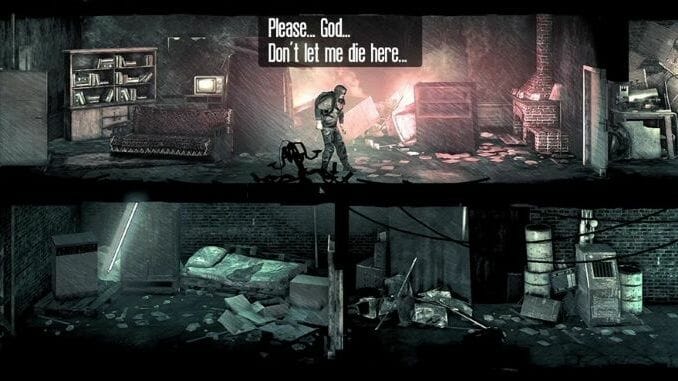This War of Mine: Final Cut Wants You to Do the Right Thing

As someone who’s been fortunate to never have witnessed armed conflict, I doubt even the most lurid depiction — fictional or nonfictional — would rival the feeling of being in actual combat. I lost my shit at seeing a violent car crash; I can’t imagine what it would actually be like to live in or around violence far exceeding that level.
But it’s not for a lack of trying from the entertainment industry. Combat is so omnipresent in videogames that it’s featured in roughly 85 percent of all titles, ranging from graphic depictions of violence to Mario jumping on a goomba, and the odd in-between found in T-rated games like Uncharted where shot enemies seem to spray faint mists of ketchup as they die. One of the largest videogame franchises of all time, Call of Duty, is dedicated to recreating historic, modern and fictional warfare with extreme levels of violence.
This War of Mine, originally released in 2014 and recently remastered for PlayStation 5 and Xbox Series X/S, aims to capture a different aspect of war: the effect it has on civilian life. Based largely on the years-long siege of Sarajevo in Europe, the Polish developer 11 Bit Studios aimed to create an experience that simulates what it’s like to try to survive an unpredictable, disturbing and deeply depressing war from the perspective of people who want nothing to do with it.
The game thrusts you into the day-to-day simulation without much context or tutorialization. This is an intentional choice, according to senior writer Pawel Miechowski in an interview with Rock, Paper, Shotgun, because “when war breaks out no-one would tell you what to do, there would be no tutorial.” I, a coward, looked up tips on how to get through the game online before I even started.
It runs a bit like more calming life simulators, where you take control of one character at a time and assign others to complete different tasks like cooking, eating, sleeping or building. At night, you assign characters to automatically sleep or guard our home and can take one character out to scavenge for resources.
After I had cleared the first few risk-free areas, I decided to check out a homeless shelter in which non-combative people hung out. My first trip, I only took what was acceptable to take without stealing. The second time around, I took a look at what they had, and was immediately tempted by the plethora of food, medicine and other high-value resources they had. I assessed the area and noticed that nobody had any weapons, and my character was far faster than any of them.
I stole from the homeless.
For the rest of the game, I barely left home at all. We had gathered so much from that one trip that I only had to briefly visit other low-risk areas without needing to steal anything. We had a good cook and another character who cheered everyone up after temporarily becoming depressed over stealing the few resources that were keeping maybe around 10 people alive. Because I wasn’t going into risky areas, I sold most of our weapons in exchange for food, which we rationed out every other day, only feeding ourselves when we became hungry enough that it impaired our functioning. I slipped into a comforting, boring routine where everyone had enough to survive, knowing that it was because of one action that condemned innocent people to die.